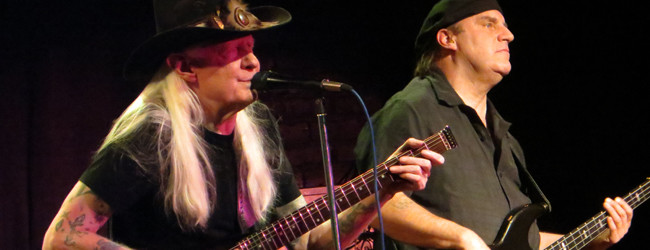
Johnny Winter, once the fastest blues guitarist around, has been eligible for social security for a half decade or more, yet his fingers remain as youthful as someone half his age.
Winter tore down the house at New Haven’s Toad’s Place on a recent Friday night, a modest bar and dance club surrounded by the dormitories of Yale University.
“I was pretty impressed,” said Bob Machaud of Cromwell. “The last time I saw Johnny was 1970. He had more energy for this show than he did then. He may be getting older but he’s getting better.”
Middletown’s Frank Johnson agreed.
“I saw him here eight years ago,” he said. “I think he was a little better tonight.”
Once touted as the American version of Eric Clapton, Winter’s career stalled in the 1970s due to a heroin addiction. Four decades later, Winter is addiction free, thanks in part to back-up guitarist/manager Paul Nelson.
In charge of Winter’s career since 2005, Nelson helped his boss quit alcohol, anxiety pills and methadone he had been taking since the early 1970s as treatment for his dope addiction. Nelson’s efforts have resuscitated Winter’s career, as faithful fans are noticing marked improvement in the singing and playing of their guitar hero.
Dressed in jeans, a black T-shirt and a black cowboy hat for the Toad’s show, Winter -with his headless Erlewine Lazer guitar – took a seat at center stage and launched into a version of “Johnny B. Goode” that made Chuck Berry’s 1958 original seem sedate by comparison. In fact, drummer Vito Liuzzi broke a snare a few minutes into the tune.
No matter who the original artist is, whenever Winter does a cover, it turns into a blues or rock ‘n roll song on steroids. That is, except, when the song is truly a slow blues.
Winter would follow “Johnny B. Goode” with more danceable numbers, “Good Morning Little School Girl” and “Got My Mojo Working,” both made famous by Muddy Waters. Winter, as most blues fans know, was not only a fan of Muddy, but he also produced four albums for him in the 1970s, three of which won the Grammy for “Best Ethnic or Traditional Recording.”
After opening up his concert with three uptempo songs, Winter switched things up with the slow-burning “Blackjack,” a 1954 cut by Ray Charles. One concert-goer, Frank Johnson of Middletown, said it was the show “highlight” for him.
AmericanBluesScene can’t argue with Johnson, as “Blackjack” allowed Winter to show off more of his vocal chops than say Winter’s “Boney Maroney” and souped-up versions of The Rolling Stones’ “Jumpin’ Jack Flash” and Bob Dylan’s “Highway 61 Revisited.”
As far as guitar, it was an exercise in perfect phrasing, and proof that Winter can wow ’em without speed or a slide on his finger.
Winter would also treat the crowd to Lonnie Brooks’ “Don’t Take Advantage of Me,” and The Rolling Stones “Gimme Shelter.”
About an hour and 10 minutes into the show, it seemed the concert had come to an end, as Winter walked off stage after performing another song associated with the Stones, “It’s All Over Now,” but originally written and performed by Bobby Womack. It was the only one Winter, who has hip problems, stood up to sing, so it definitely seemed this was perhaps the show’s finale.
However, Winter would return to the stage a few minutes later, this time with his trusty hunk of wood, a 1963 Gibson Firebird V he’s been playing since Richard Nixon was President.
Slide guitar playing was apparently the encore, as Winter now had a metal pipe on his left pinky.
Winter launched into a near roof-raising version of the Elmore James classic “Dust My Broom” and followed up with an amped-up “Highway 61 Revisited” before truly calling it a night.
Known for his slide guitar mastery – which has helped to see him recently ranked the 16th greatest blues guitarist by Guitarist magazine, as well as 63rd on Rolling Stone magazine’s list of the 100 greatest guitarists of all-time – the night wrapped up perfectly for most fans. Conversely, a few thought Winter waited far too long to showcase what he’s so great at.
Local blues artist Blind Smokin’ Jones thought the show picked up a notch when Winter broke out the slide, using it for the show’s final 16 minutes.
“It was like the old Johnny Winter, prime Johnny Winter,” he said.
Slide or no slide, Winter is one of the few remaining true blues guitar heroes, included on a short list that includes B.B. King and Buddy Guy.


